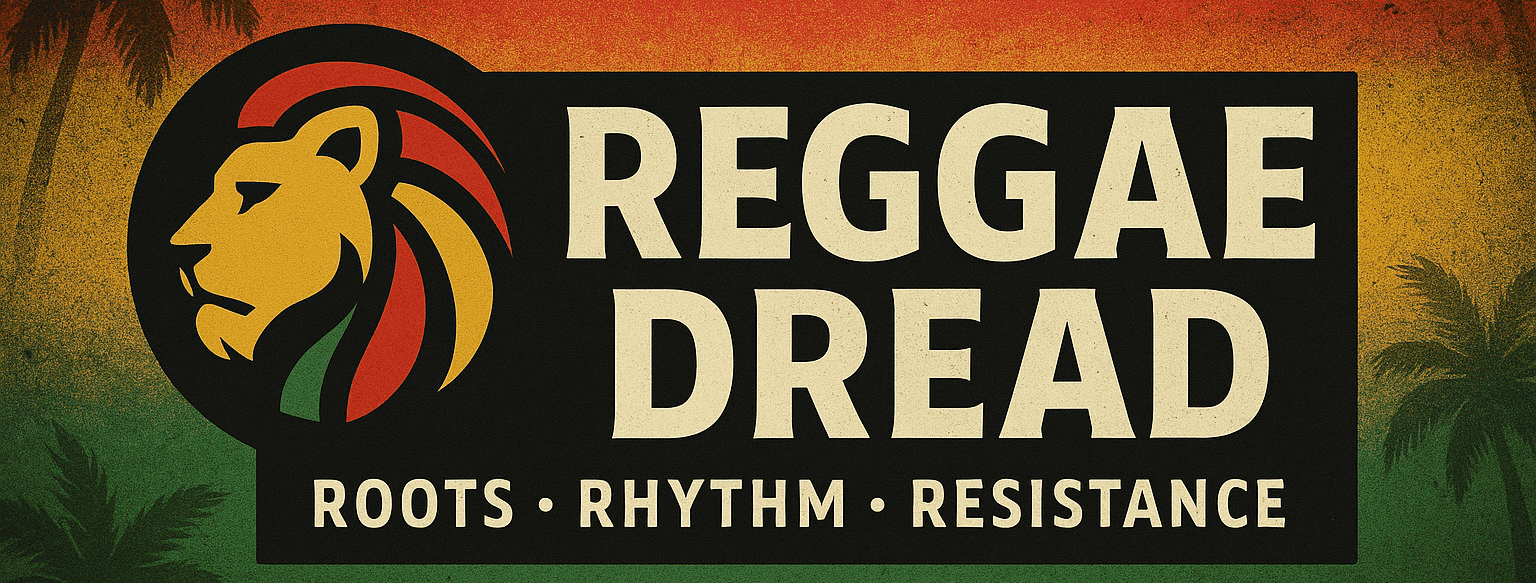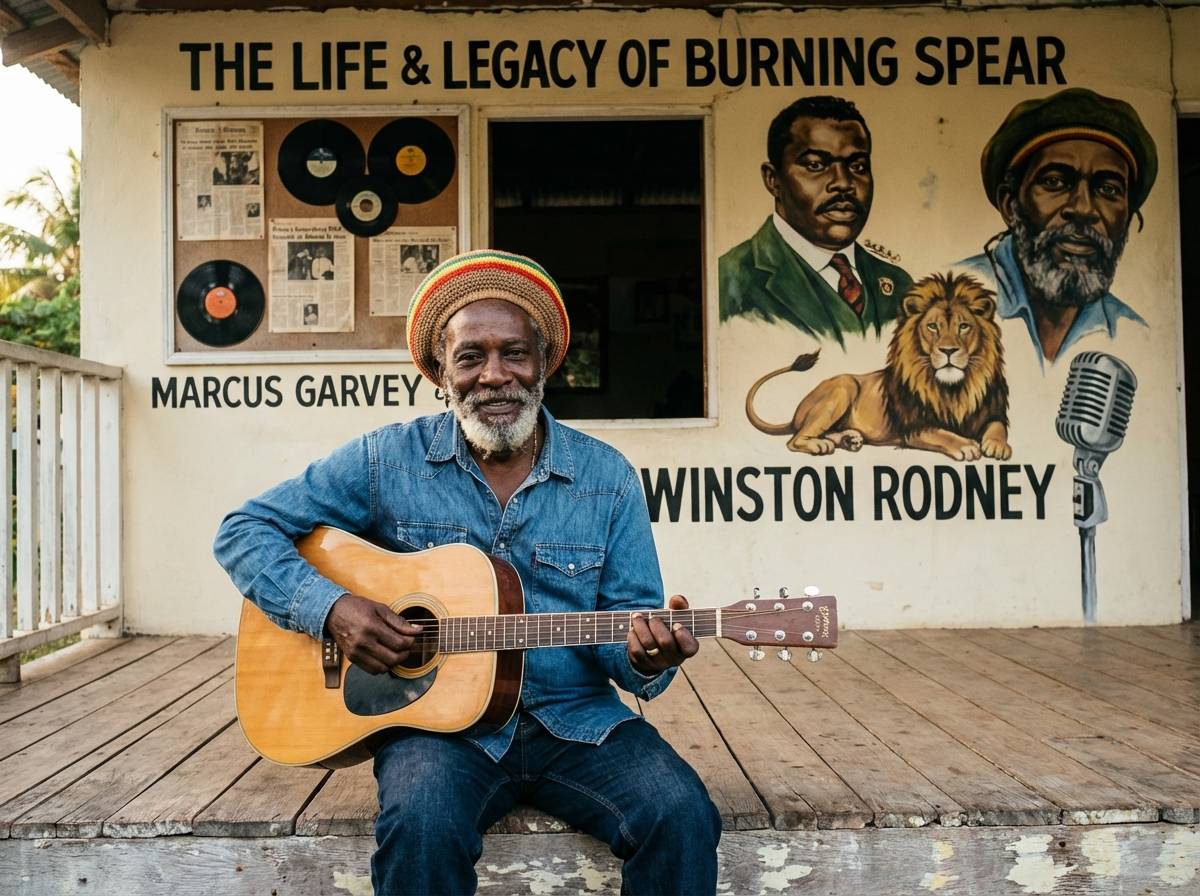Burning Spear Biography, Part 1: Roots in St. Ann (1945–1968)

Introduction: Before the Spear Was Lit
Long before the name Burning Spear echoed across festival stages, vinyl grooves, and sound system speakers, there was a quiet youth named Winston Rodney walking the hills and streets of St. Ann’s Bay, Jamaica. Born on March 1, 1945, in this coastal town on Jamaica’s north coast, Rodney grew up in a parish already charged with history — the same St. Ann that produced Marcus Garvey and later, another global icon, Bob Marley.
Part 1 of this 12-part biography traces those foundational years from 1945 to the late 1960s — a period before hit records and Grammy awards, when the man who would become Burning Spear was still piecing together his identity, his spiritual outlook, and his sense of mission. To understand his music, we first have to understand the soil he grew from: rural St. Ann, colonial tensions, village rhythms, and the lingering voice of Garveyism in everyday life.
These early years don’t just provide “background information.” They are the root system of the entire tree: the memories of hill life, the sound of old radios catching distant American stations, the spiritual pull of Rastafari, and the slow realization that music could be a vehicle for history, resistance, and inner strength.
St. Ann’s Bay: A Parish of Prophets
Geography, Coastline, and Hills
St. Ann is often called the “Garden Parish” of Jamaica — a place where lush hills roll down to sparkling coastline. For a young Winston Rodney, those hills were not tourist attractions; they were simply home. Narrow roads wound through farming communities, small shops, and yards where goats, children, and elders all shared the same sun. The sea wasn’t just scenery; it was livelihood, freedom, and sometimes the only horizon many people saw.
Growing up in this environment meant being surrounded by the rhythms of daily Jamaican life: farmers heading to their plots at dawn, fisherfolk returning with the morning catch, market women balancing baskets overflowing with produce, and church bells cutting through the sound of the waves. These textures would later surface in Burning Spear’s lyrics — the hills, the rivers, the “man in the hills” standing in contrast to city Babylon.
Sharing a Birthplace with Marcus Garvey
St. Ann’s Bay is also the birthplace of Marcus Mosiah Garvey, the Pan-African visionary whose ideas deeply influenced Winston Rodney’s worldview and later his music. Garvey’s emphasis on self-reliance, African pride, and unity among Black people became foundational to the Rastafari movement and to many roots reggae artists. Burning Spear would eventually dedicate entire albums and songs to Garvey’s message, including the seminal Marcus Garvey album released in 1975.
For a young boy in St. Ann, the presence of Garvey’s legacy wasn’t an abstract idea. It lived in stories told by elders, in community pride, and in the sense that this little parish mattered to the whole world. The fact that St. Ann produced Garvey — and later, both Bob Marley (from Nine Mile) and Winston Rodney — gave the area a quiet but powerful sense of destiny.
Post-War Jamaica and Colonial Tensions
Winston Rodney’s childhood unfolded in a Jamaica still under British colonial rule. The 1940s and 1950s were decades of deep social change: labor movements, calls for independence, and a growing consciousness that the island’s people deserved self-determination. These larger forces shaped the atmosphere of St. Ann, even if young Rodney didn’t yet have the words to describe them.
In many communities, there was a clear sense of economic struggle. Jobs were scarce, opportunities were limited, and racial/social hierarchies were very real. It’s not hard to see how these realities would later find their way into Burning Spear’s lyrics — songs about “Slavery Days,” “Marcus Children,” and the long shadow of exploitation. Even as a child, he was absorbing a world where justice and injustice sat side by side.
Growing Up Winston Rodney: Family, Work, and Early Responsibilities
Family Life and Household Values
Details about Rodney’s early family life are often sketchy in public biographies, but what comes through clearly is a picture of discipline, respect, and hard work. St. Ann families of that era typically shared responsibilities: children were expected to help with chores, contribute to farming or small business, and show respect to elders and community leaders.
These values would later echo in Burning Spear’s stage presence and public persona. He has long been known for his sense of seriousness, integrity, and resistance to frivolity in the music business. Even as fame grew, Rodney stayed rooted in a mentality formed long before record contracts — a mentality that treated work and responsibility as sacred duties rather than burdens.
Education, Learning, and Quiet Observation
Like many Jamaican youths of his generation, Winston Rodney would have passed through the island’s basic school system, absorbing reading, writing, and arithmetic during the day and an entirely different kind of education after hours: the education of the yard, the street, the hills, and the marketplace.
One thing stands out in many accounts of his character: he is an observer. Long before stepping into a studio, Rodney seems to have been someone who watched people closely — how they walked, how they worked, how they suffered, how they laughed. That observational quality later allowed him to write songs that felt less like “stories about himself” and more like reflections of an entire people’s journey.
Early Work and the Weight of Responsibility
Jobs in mid-20th-century rural Jamaica were rarely glamorous: farming, laboring, small-town trades, and odd jobs made up the bulk of opportunities available to young men. Whether working in fields or assisting in local trades, Rodney would have experienced the physical demands of manual labor — something that later gave authenticity to his portrayal of working-class life in song.
That sense of work, sweat, and struggle flows through his later albums. There’s a tangible difference between a songwriter who “imagines” hardship and one who has lived it. Burning Spear’s music always carries the weight of lived experience, even when lyrics are simple and chant-like.
The Soundtrack of a Young Spear: Radio, R&B, and Roots
American Radio Waves over Jamaica
As a teenager, Winston Rodney listened to music broadcasts from U.S. radio stations whose signals reached Jamaica. Those airwaves carried R&B, soul, and jazz, and he has specifically cited artists such as Curtis Mayfield and James Brown as powerful influences.
Imagine the scene: a small radio, perhaps shared by several people, crackling in the night as unfamiliar but compelling sounds pour from the speaker — horn lines, tight rhythm sections, call-and-response vocals, and singers who weren’t afraid to speak directly about struggle, hope, and dignity. For a young Jamaican in St. Ann, this was not just entertainment; it was a glimpse into a wider Black Atlantic soundscape.
Curtis Mayfield, James Brown, and the Seeds of Conscious Music
Curtis Mayfield, with his falsetto pleas and socially conscious lyrics, modeled a way of singing that blended sweetness with seriousness. James Brown, with his raw power and emphasis on rhythm, offered another blueprint: music that hit the body first but still carried a larger message about identity and empowerment.
These artists didn’t “turn” Winston Rodney into Burning Spear by themselves, but they helped shape his sense of what music could do. They showed that a song could be both deeply spiritual and politically charged, both danceable and educational. That combination would eventually become a hallmark of Burning Spear’s roots reggae.
Local Sounds: Mento, Nyabinghi, and Community Singing
While American records came from afar, Jamaican folk traditions were right at home. Rural communities in St. Ann would have been saturated with mento (Jamaican folk music), church hymns, drumming traditions, and early forms of what would evolve into ska and rocksteady.
Rastafari gatherings, where Nyabinghi drumming and chanting were central, also increasingly shaped the soundscape. Even before formally aligning himself with Rastafari, Rodney lived in a country where their rhythms and presence were impossible to ignore. The heartbeat drum, the steady pulse — these would later define the meditative groove of Burning Spear’s music.
Garvey’s Shadow and the Rise of Rastafari
Marcus Garvey as a Living Presence
For many Jamaicans, especially in places like St. Ann, Marcus Garvey was not merely a figure from history books. He was a living presence in community memory. Even after his passing, his ideas about Black pride, race consciousness, and global African unity spread through churches, street-corner conversations, and grassroots organizations.
Winston Rodney would eventually become perhaps the most consistent musical interpreter of Garvey’s philosophy. But long before songs like “Marcus Garvey” or “Old Marcus Garvey,” he was a young man walking the same parish, hearing elders speak the name with reverence, and absorbing the idea that Black people had a story that needed to be told honestly.
Rastafari, Emancipation, and Spiritual Inquiry
The Rastafari movement emerged in Jamaica in the 1930s and continued to grow through the 1940s and 1950s, especially among the poor and working class. Its emphasis on repatriation, resistance to “Babylon,” and the divinity of Haile Selassie I resonated deeply with those who felt alienated by colonial society.
Rodney’s eventual identification as a dedicated Rastafarian would define his career, but the seeds of that commitment were likely sown in these formative years — in the presence of dreadlocked elders, in reasoning sessions, and in the quiet appeal of a spiritual path that insisted Black life was sacred and history was not finished.
From Local Stories to Global Message
One of the distinctive features of Burning Spear’s music is how seamlessly he connects local Jamaican experiences to wider African and diaspora narratives. This is not an accident. Growing up in St. Ann gave him a front-row seat to both: the intimate struggles of rural life and the universal themes of exile, memory, and redemption.
By the time he would step into a Kingston studio, Rodney was already carrying decades of stored observation and reflection, even if he was only in his twenties. The hills had spoken to him; the sea had spoken; Garvey had spoken; the drums had spoken. Music would simply become the organizing language.
From St. Ann to Kingston: The Pull of the Capital
Jamaica Approaches Independence
The 1950s and early 1960s were pivotal. Jamaica achieved independence from Britain in 1962, when Winston Rodney was in his late teens. For many young people, this moment brought hope — but also questions: Would independence change their daily lives? Would opportunity suddenly appear where there had been scarcity?
At the same time, Kingston was rapidly becoming the heartbeat of Jamaican popular music. Ska, then rocksteady, then the early stirrings of reggae were taking shape in urban studios and dancehalls. For any young man with a musical ear and a message in his chest, the capital city was both a magnet and a test.
Economic Realities and the Need to Move
Rural parishes like St. Ann offered beauty and community but limited economic mobility. Many young Jamaicans migrated to Kingston in search of work, education, or simply a fresh path. For Rodney, the move toward Kingston was not just about chasing “stardom.” It was about survival, opportunity, and the quiet recognition that the island’s cultural nerve center was shifting.
This migration pattern — from countryside to capital — is reflected in countless reggae lyrics and stories. Burning Spear’s eventual reflections on city life, Babylon, and the contrast between hills and concrete all carry the weight of that transition.
Kingston as a Crucible of Sound
By the late 1960s, Kingston was home to studios like Studio One, Treasure Isle, and others that would define Jamaican music. Sound systems clashed in dancehalls, producers battled for the next hit, and a generation of singers, players, and writers emerged with new rhythms and new ideas.
For a quiet young man from St. Ann, this world could be intimidating — but also full of possibility. The countryside had prepared his spirit; Kingston would now test his courage and shape his career.
The Fateful Meeting: Winston Rodney and Bob Marley
Two Sons of St. Ann Cross Paths
One of the most famous stories in Burning Spear’s biography involves a seemingly simple encounter: Winston Rodney crossing paths with Bob Marley, another son of St. Ann, in 1969. Accounts describe Rodney meeting Marley while the latter was on his way to his farm, leading to a brief but life-changing conversation about music and opportunity.
In later interviews, Rodney recalled reasoning “man to man” with Bob Marley and expressing his desire to get involved in music. Marley, recognizing the potential and knowing the landscape of the industry, advised Rodney to check Studio One, the legendary label run by producer Coxsone Dodd. :contentReference[oaicite:6]{index=6}
Advice That Opened a Door
Marley’s advice might have seemed simple, but its impact was profound. Studio One had already developed a reputation as the “Motown of Jamaica,” launching the careers of countless artists. For Rodney, this was more than a casual suggestion; it was a clear signal about where to go and who to trust as a starting point.
Armed with little more than determination and a voice trained in the hills of St. Ann, Winston Rodney took that advice seriously. From this point, the story begins to shift from formation to activation — from absorbing influences to stepping into the arena.
From Conversation to Career
The meeting with Marley effectively marks the end of this first chapter of Rodney’s life and the beginning of the next. Soon after, he would travel to Studio One, audition with partner Rupert Willington, and record his first single “Door Peep,” released in 1969.
But before we jump straight into studio sessions and international releases, it’s important to recognize: none of that would have meant the same thing without the years in St. Ann. The hills, the sea, the radio, Garvey’s memory, Rastafari’s quiet pull, and the daily grind of rural life — all of these elements shaped the man who would become Burning Spear long before the world knew his name.
Why These Early Years Still Echo in Burning Spear’s Music
Hills, Villages, and the “Man in the Hills” Motif
Later in his career, Burning Spear would release the album Man in the Hills, filled with reflections on rural life and memories of his childhood in St. Ann’s Bay. The album isn’t just nostalgia; it is a spiritual return to origins — to a time before the city, before fame, before the pressures of the music business.
Listening closely to songs from that period, you can hear how the hills function not just as physical spaces but as metaphors for clarity, perspective, and rootedness. The “man in the hills” has distance from Babylon, space to think, and a closer connection to nature and the Creator.
Garvey, Memory, and Historical Responsibility
Burning Spear’s discography is full of references to Marcus Garvey: “Marcus Garvey,” “Old Marcus Garvey,” “Marcus Children,” “Social Living,” “Follow Marcus Garvey,” and more. This is not a marketing gimmick; it is a lifelong mission.
The reason Garvey’s name returns again and again is that Rodney sees himself as a musical extension of that historical struggle — a kind of sonic griot tasked with keeping memory alive. That sense of responsibility was born in St. Ann, where Garvey’s legacy was not distant, but immediate, woven into the local identity.
Rural Roots, Global Reach
One of the most powerful aspects of Burning Spear’s story is how local specificity turns into global resonance. He did not grow up in a metropolis; he grew up in a small Jamaican town. Yet the values, struggles, and spiritual questions of that environment proved universally relatable.
When listeners in Africa, Europe, the Americas, or Asia connect deeply to his songs, they are often responding to something planted in these early years: a grounded sense of place, a respect for elders, a clear-eyed view of history, and an unshakable belief that dignity is non-negotiable.
Conclusion to Part 1: From Roots to First Steps in the Music World
The story of Burning Spear’s early life in St. Ann is, at its heart, a story of preparation. From 1945 to the late 1960s, Winston Rodney was being quietly forged by environment, history, and experience:
- A childhood in the hills and on the coast of St. Ann’s Bay
- Exposure to R&B, soul, jazz, and Jamaican folk traditions
- Living in the long shadow of Marcus Garvey’s example
- Witnessing Jamaica’s transition from colony to independent nation
- Feeling the early pull of Rastafari spirituality
- Carrying the weight of work, responsibility, and community expectations
By the time he met Bob Marley and received that crucial advice to visit Studio One, Winston Rodney was not an empty vessel waiting to be filled. He was already a man of depth, observation, and quiet conviction. The studio would provide a microphone, but the message had been in formation for decades.
In the next part of this 12-part series, we’ll follow Burning Spear as he steps into Kingston’s legendary Studio One, records his first singles, and begins the transformation from a young man from St. Ann into an emerging roots reggae voice that would soon speak to the world.
Continue to Part 2: “Studio One Sessions & Early Recordings (1969–1974)”



























